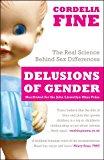
Synopsis (from amazon)
This is a vehement attack on the latest pseudo-scientific claims about the differences between the sexes – with the scientific evidence to back it up. Sex discrimination is supposedly a distant memory. Yet popular books, magazines and even scientific articles increasingly defend inequalities by citing immutable biological differences between the male and female brain. Why are there so few women in science and engineering, so few men in the laundry room? Well, they say, it’s our brains. Drawing on the latest research in developmental psychology, neuroscience, and social psychology, “Delusions of Gender” rebuts these claims, showing how old myths, dressed up in new scientific finery, help perpetuate the status quo. Cordelia Fine reveals the mind’s remarkable plasticity, shows the substantial influence of culture on identity, and, ultimately, exposes just how much of what we consider ‘hardwired’ is actually malleable. This startling, original and witty book shows the surprising extent to which boys and girls, men and women are made – and not born.
Review
This book has been on my kindle since 2014 (according amazon anyway), which makes me wonder how long some of my ‘real’ books have been on the shelves unread.
I kind of wish I had read it sooner, but I’ve been on a bit of a roll when it comes to non-fiction recently, so maybe I just wasn’t in the right frame of mind before.
It was a while ago so more exact details are lost to me, but there are certain things which still stand out, and in a way doesn’t that make for a better review? I was helped a little to remember by reading Ruth’s review (which I recommend).
Delusions of Gender did take a little getting into, in terms of a ‘sciencey’ book it was easy to read, and it was interesting, but not necessarily immediately engaging.
I did find some of the arguments a bit repetitive, which makes sense when you’re talking about different but similar studies, but not so much when you are talking about the same one. It is difficult though if you are referring to something said earlier to know how much to say to make sure the person you are writing to knows what you are referring to.
The main thing I got out of it really is about how much difference small things might be able to make, especially when a child is still trying to work out their identity. Would not gendering a child change this? I’m not so sure, at some point the child themselves would want to know what they are, and I’m sure they could work it out.
In a way those little things seem hopeless, because they’re the type of things that you don’t even think about, so how can you hope to have a gender neutral environment.
4/5
Buy:
Kindle (£4.68)
Paperback (£8.99)







